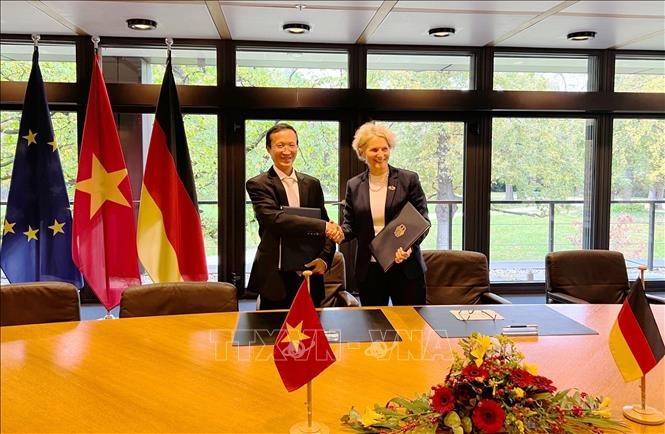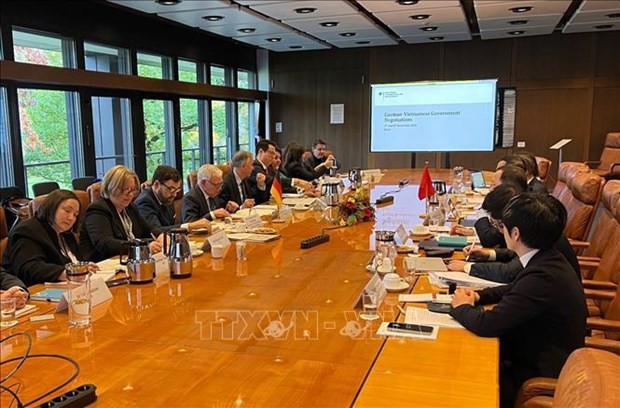Vietnam and Germany have signed an agreement on official development assistance (ODA) for Vietnam in the 2024-2025 period, as reported by VNA.
The Vietnamese delegation was led by Director General of the Department of Foreign Economic Relations under the Ministry of Planning and Investment Pham Hoang Mai, with the participation of representatives from the Government Office, Ministry of Finance, and Ministry of Agriculture and Rural Development.
The German side was led by Jochen Flasbarth, State Secretary in the German Federal Ministry for Economic Cooperation and Development (BMZ), with the participation of representatives of German funding organizations such as the German International Cooperation Organization (
GIZ
), KfW Bank (German Reconstruction Bank), and the German Embassy in Hanoi. Vietnamese Ambassador to Germany Vu Quang Minh attended the meeting.
 |
| Director General of the Department of Foreign Economic Relations under the Ministry of Planning and Investment Pham Hoang Mai and Director General of Department of Foreign Economic Relations Pham Hoang Mai and Director General and Commissioner for Asia of BMZ Gisela Hammerschmidt. Photo: VNA |
On behalf of the Governments of Vietnam and Germany, Director General of the Department of Foreign Economic Relations Pham Hoang Mai and Director General and Commissioner for Asia of BMZ Gisela Hammerschmidt signed the agreement at the end of the annual meeting on bilateral cooperation between Vietnam and Germany held from November 7-8 in Bonn, Germany.
At the meeting, the two sides reached an agreement on projects and ODA in the 2024-2025 period. They also reviewed the implementation of agreements and commitments related to ODA in 2022-2023 and made policy recommendations to address shortcomings and challenges in the process of ODA disbursement and implementation of projects funded by Germany’s ODA and non-refundable technical grants in Vietnam.
The two sides also agreed that the next meeting will be held in Vietnam in 2025.
 |
| Participants at the annual meeting on bilateral cooperation between Vietnam and Germany held from November 7-8 in Bonn, Germany. Photo: VNA |
Regarding Germany’s development cooperation with Vietnam, in 2021, the German Government committed to providing EUR 152.11 million (USD 162.64 million) in development and technical cooperation aid to Vietnam.
Seven bilateral projects within the framework of the International Climate Initiative are being implemented with a total value of about EUR 25.4 million (USD 27.090), focusing on climate-related policy consultancy on greenhouse gas reduction, adapting to the impacts of climate change, and conserving biodiversity.
Germany’s Federal Ministry for the Environment, Nature Conservation, Nuclear Safety is funding an EUR-11-million project on combating marine waste in Vietnam. Three bilateral projects with a total planned capital of EUR 39 million (USD 41.600) are under preparation. In addition, Vietnam will receive a total funding of about EUR 64 million (USD 68.260) from Germany for three regional projects and two global projects.
Overall, the German Government regarded development cooperation with Vietnam as “successful” and the quality of cooperation and the effectiveness of the “triangular cooperation” with Vietnam as “very good”. Germany’s development policies play an important role in strengthening political ties with the Association of Southeast Asian Nations (ASEAN), including in the areas of environment, climate, and energy policy, good governance, vocational training, connectivity, international law, rules-based international order, and human rights.
Ethnics Minorities Literature and Arts Award winners honoured
NDO – The Vietnamese Ethnic Minorities Art and Literature Association held an awards ceremony in Hanoi on December 21 to honour 50 outstanding literature and art works in 2020.
Letters from a Frenchman Inspire Vietnamese Mountain Girl
Lang Thi Ngan (2002) grew up in Tu Do mountain commune, Quang Hoa district, Cao Bang province. Due to difficult living conditions, studying is therefore not a priority, especially for girls like Ngan. When these ethnic minority girls grow up, they are often expected to get married early, become farmers, or work far away from home. This has gone on for generations, but Ngan had a different plan.








